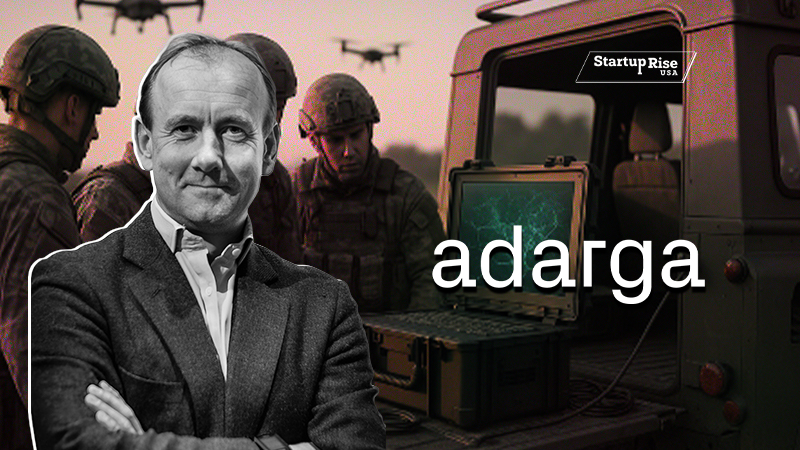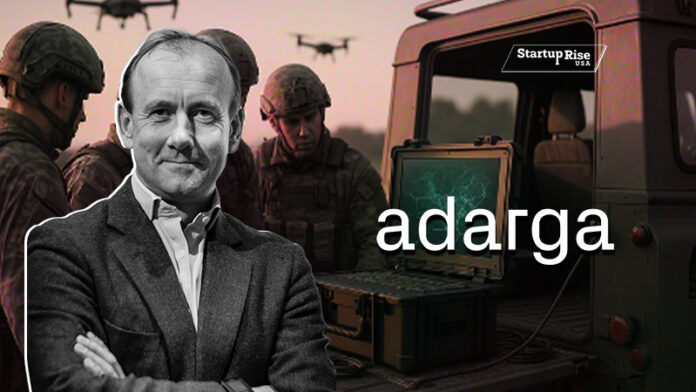
From Soldier to Startup Founder
Robert Bassett Cross holds a unique background that bridges military operations, finance and deep technology. According to his profile, he is a former British Army officer who served in demanding operational roles across the Middle East, Central Asia and Africa.
After his military career, Cross joined the corporate world: he worked at J.P. Morgan in investment banking, focusing on corporate finance and M&A in the defence and aerospace sectors.
He holds a law degree (LLB (Hons)) from the University of Exeter. In 2016 (or around 2015/16) he founded Adarga in the UK, with the mission to apply advanced AI analytics to help organisations derive intelligence from vast volumes of unstructured data.
The Spark: Tackling “Too Much Data, Too Little Insight”
Cross’s motivation for founding Adarga grew out of his first-hand exposure to intelligence and information overload—in both military and corporate settings. He observed how decision-makers struggled with rapidly expanding volumes of text, voice and multimedia data, and how traditional methods failed to surface insight in time.
He asked: What if an AI platform could process unstructured data at scale, extract context, connect patterns and deliver actionable intelligence to analysts and decision-makers? That question formed the basis of Adarga’s founding vision.
Building Adarga: Mission, Product & Market
Adarga positions itself as a UK-based AI software company specialising in “information intelligence”: helping defence, national security and commercial organisations digest, contextualise and act on large volumes of data.
Their flagship product is called Vantage, built on Adarga’s engine and bench modules, utilising natural language processing (NLP), machine learning and network science to ingest, process and reveal patterns in unstructured data (reports, open-source feeds, multimedia, multiple languages).
Read Also- From Sleepless Nights to Smart Cribs: The Cradlewise Journey
Key characteristics of the platform:
- Supports hundreds of languages and millions of data-points.
- Tailored for use-cases in defence, national security, supply-chain risk, commercial intelligence.
- Focus on decision advantage: enabling analysts to move from data-collection to insight to decision-making.
Under Cross’s leadership, Adarga moved rapidly from founding to securing Series A funding (£5 million) in 2019, led by Allectus Capital.
In 2023 the company announced a US$20 million funding round, led by BOKA Group, signalling expanded ambition and recognition of the geopolitical & intelligence market.
Adarga continues to secure major contracts: for example a multi-year renewal contract with the UK Ministry of Defence worth up to £12 million.
Leadership Style & Philosophy
Robert Bassett Cross brings a blend of mission-focus, operational discipline and business acumen. His military background gives him direct credibility in defence & intelligence markets, while his investment banking experience anchors commercial viability.
In his own words he emphasizes the need for AI that complements human judgement rather than replaces it: enabling analysts to operate at speed and scale with confidence. For example:
“The vast majority of information in our world is unstructured and inaccessible. Making sense of this represents the largest data opportunity for all organisations around the world.”
He also champions responsible AI, alignment with defence values and interoperability among allies (UK/US):
“Adarga is committed to deep, long-term partnerships with our closest allies… AI technology is in the unique position to embolden thinking across the allied defence community…”
This dual focus on purpose and performance sets the tone for the company culture.
Challenges & Turning Points
Adarga’s journey has encountered several strategic and execution challenges:
- Enterprise & defence market entry: Convincing large defence / intelligence customers to adopt new AI platforms is slow—boring procurement cycles, classification/safety requirements, trust issues.
- Data complexity: Processing huge volumes of unstructured and open-source data, across languages and modalities, requires deep technical investment and iteration.
- Scaling globally: From its UK base, Adarga has expanded into Australia and the U.S. in response to demand.
- Regulation & classification: Operating in defence/national security entails high levels of security, oversight and compliance.
- Differentiation in the AI market: The “analytics for unstructured data” space is increasingly competitive; executing on value and demonstrating ROI remains critical.
Cross and his team have navigated these by emphasising domain-specific AI, building bespoke solutions, partnering with major organisations (e.g., KBR in the U.S.)
Why His Story Matters
Robert Bassett Cross’s journey is significant for several reasons:
- Multi-disciplinary: He spans military, finance and technology—demonstrating how deep sector experience matters in founding high-impact AI ventures.
- Mission-driven: He didn’t just build another AI startup—he aimed to deliver decision advantage in defence/intelligence, a high-stakes domain.
- Start-up to scale-up: From founding in 2016 to securing multi-million-dollar funding and global clients within less than a decade is notable.
- Emerging tech in critical infrastructure: His work shows how advanced AI is being embedded into national security and intelligence—not just commercial consumer apps.
- Ally & ecosystem mindset: Working across UK, US, allied forces and commercial sectors highlights the importance of ecosystem partnerships in tech leadership.
The Road Ahead & Vision
Looking forward, under Cross’s leadership, Adarga is likely to focus on:
- Further geographic expansion (especially in U.S., Australia, NATO/Allied markets).
- Deepening product capabilities: real-time AI, large language model (LLM) integration, network science, real-time open-source intelligence (OSINT) processing.
- Strengthening commercial verticals: beyond defence into supply-chain risk, insurance, critical infrastructure intelligence.
- Maintaining sovereign capability and trusted partner status for governments, while scaling commercial business.
Enhancing responsible AI, transparency and human-machine collaboration in high-stakes decisions.



